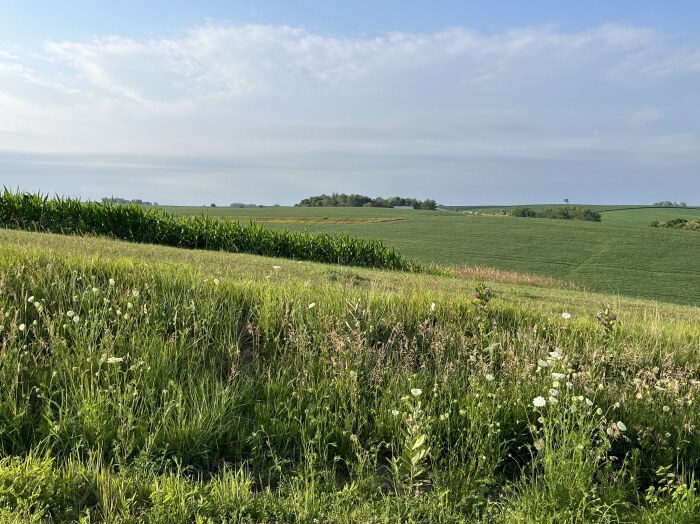Bonnie Ewoldt is a Milford resident and Crawford County landowner.
North Dakota’s Public Service Commission threw a major roadblock in the path of Summit Carbon Solutions’ Midwest Carbon Express on August 4 when its three members unanimously denied the company’s hazardous CO2 pipeline permit. According to the commission’s chair, Randy Christmann, Summit “failed to meet its burden of proof to show that the location, construction, operation and maintenance will produce minimal adverse effects on the environment and upon the welfare of the citizens of North Dakota.”
Summit’s proposed route in North Dakota was part of a 2,000-mile, five-state Carbon Storage and Sequestration (CCS) plan to carry hazardous liquid CO2 from seventeen ethanol plants in South Dakota, Nebraska, Minnesota, and Iowa to North Dakota. where it would be permanently buried underground in abandoned oil wells west of Bismarck. When operational, investors in the $5.5 billion project would reap billions of dollars profit in carbon capture with 45Q federal tax credits.
However, without the Public Service Commission permit and access to North Dakota’s underground storage sites, the Midwest Carbon Express is a pipeline to nowhere.
The Midwest Carbon Express is on shaky ground all along its multi-state route. Summit is seeking a permit in Iowa with only two-thirds of easements voluntarily signed. Hundreds of Iowa landowners refuse to sign and choose instead to face the prospect of eminent domain. Minnesota requires an Environmental Impact Study and will not allow eminent domain to be used for this project. South Dakotans are outraged by the lack of action in their legislature, and thousands have signed a petition demanding Governor Kristi Noem call a special session.
Summit’s risky CO2 pipeline faces strong opposition. Environmentalists, conservatives, Indigenous peoples, Republicans, Democrats, independents, and civic groups have joined with impacted landowners to stop one of the biggest land grabs in recent U.S. history. A recent Iowa Poll by Selzer & Co for the Des Moines Register found that 78 percent of Iowans across all demographics oppose the use of eminent domain for the dangerous CO2 pipelines being built by a private company for profit.
In Iowa, Summit-impacted landowners, the Sierra Club, and other interested parties have been frantically preparing for the Iowa Utilities Board hearing for Summit’s permit, scheduled to begin in two short weeks on August 22. Recently, the board unexpectedly rescheduled the hearing from an anticipated start in October. This move by the Iowa Utilities Board was a sucker-punch to intervenors, who suddenly had months less time to prepare testimony and consult with legal counsel.
Now that Summit has no way to get to the sequestration site in North Dakota, and the Midwest Carbon Express has no endpoint, the board should postpone its hearing indefinitely. Without a carbon storage and sequestration location, there is no reason to waste time, resources, and tax-payer money to hold a hearing on a half-baked proposal for Summit’s permit.
The Iowa Utilities Board needs to put the brakes on the Midwest Carbon Express. There is no urgent need to approve a permit for a dangerous CO2 pipeline to nowhere.
Top photo of the Ewoldt farm in Crawford County provided by the author and published with permission.


3 Comments
Arrogance karma
Summit and its competitors have not been transparent about their goals and means. This is surprising because Carbon sequestration is a national priority to mitigate climate change. The large tax credits are a testimony of the relevance of their efforts. Had Summit and competitors treated landowners more respectfully, explained the ecological benefits better, they may have had an easier way through.
Karl M Sat 5 Aug 12:35 PM
Steve King
Odd to see Bleeding Heartland and former Congressman Steve King on the same side.
Farmers will realize another dollar a bushel for corn if states accept the carbon credits offered by the feds. If the world has decided on green energy then we have find a way to include ethanol in that equation. Carbon storage and the carbon credits would be the solution. Each ethanol plant uses 80 million bushels of corn every year. We can’t lose that. Other options are too expensive.
Tough problem. We should be able to figure out.
tyrone2101 Sun 6 Aug 7:17 AM
Thank you, Bonnie Ewoldt...
for writing this post and for working on this issue.
PrairieFan Mon 14 Aug 12:59 PM